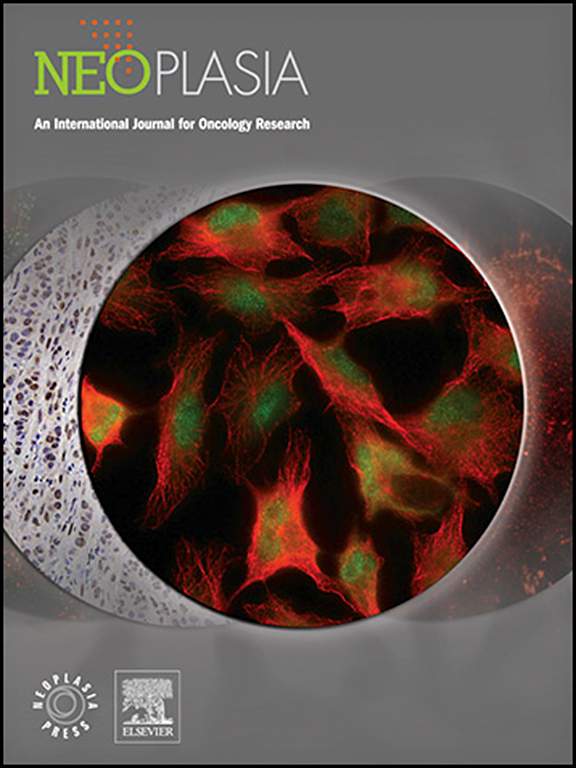Prognostic role of high MTAP expression is reversed by the ERG status in prostate cancer treated by radical prostatectomy
IF 7.7
2区 医学
Q1 Biochemistry, Genetics and Molecular Biology
引用次数: 0
Abstract
Loss of S-methyl-5′-thioadenosine phosphorylase (MTAP) expression offers a therapeutic option through synthetic lethality and confers resistance to immune checkpoint inhibitors in various cancers. To assess MTAP prevalence in prostate cancer, a tissue microarray of 17,747 samples was analyzed via immunohistochemistry. Normal prostate glands showed weak to moderate cytoplasmic MTAP staining. In 13,189 interpretable cancers, a complete loss of MTAP staining was seen in 33 (0.3 %) tumors, while MTAP staining was considered 1+ in 14.8 %, 2+ in 42.2 %, and 3+ in 42.7 % of tumors. Fluorescence in situ hybridization analysis of 9 MTAP-negative cancers confirmed homozygous MTAP deletion in all of these tumors. MTAP staining was significantly stronger in cancers harboring the TMPRSS2:ERG fusion than in ERG fusion negative tumors (p < 0.0001). A comparison with clinico-pathological features revealed inverse correlations depending on the ERG fusion status: In ERG-negative cancers, high (3+) MTAP expression correlated with advanced pT stage, high Gleason grade, and early PSA recurrence (p < 0.0001 each). Conversely, in ERG-positive tumors, MTAP expression decreased with advanced pT stage (p < 0.0001), high classical (p = 0.0004) and quantitative Gleason grade (p = 0.0005), and low (1+) MTAP expression was significantly linked to early PSA recurrence (p = 0.0012). Comparison with 11 previously analyzed chromosomal deletions identified ERG-status-dependent positive or negative associations between MTAP expression and deletions of PTEN and 12p13 (p ≤ 0.0274), suggesting functional interactions. Taken together, the results of our study demonstrate that MTAP deficiency is exceedingly rare in prostate cancer, while high MTAP expression is a strong and independent marker for poor prognosis in ERG negative cancers.
在根治性前列腺切除术治疗的前列腺癌中,高MTAP表达的预后作用被ERG状态逆转
s -甲基-5′-硫代腺苷磷酸化酶(MTAP)表达的缺失通过合成致死性提供了一种治疗选择,并在各种癌症中赋予免疫检查点抑制剂耐药性。为了评估MTAP在前列腺癌中的患病率,通过免疫组织化学分析了17,747个样本的组织微阵列。正常前列腺显示弱至中度细胞质MTAP染色。在13189例可解释的癌症中,33例(0.3%)肿瘤完全丧失MTAP染色,14.8%的肿瘤认为MTAP染色为1+,42.2%的肿瘤认为MTAP染色为2+,42.7%的肿瘤认为MTAP染色为3+。9例MTAP阴性肿瘤的荧光原位杂交分析证实,所有这些肿瘤均存在MTAP纯合缺失。MTAP染色在具有TMPRSS2:ERG融合的肿瘤中明显强于ERG融合阴性的肿瘤(p <;0.0001)。与临床病理特征的比较显示,ERG融合状态与MTAP呈负相关:在ERG阴性的癌症中,高(3+)MTAP表达与晚期pT分期、高Gleason分级和早期PSA复发相关(p <;0.0001每个)。相反,在ergg阳性肿瘤中,MTAP的表达随着pT分期的进展而降低(p <;0.0001),高经典(p = 0.0004)和定量Gleason分级(p = 0.0005),低(1+)MTAP表达与早期PSA复发显著相关(p = 0.0012)。与先前分析的11个染色体缺失进行比较,发现MTAP表达与PTEN和12p13缺失之间存在erg状态依赖的正相关或负相关(p≤0.0274),提示功能相互作用。综上所述,我们的研究结果表明,MTAP缺乏在前列腺癌中极为罕见,而MTAP高表达是ERG阴性癌症预后不良的一个强有力的独立标志。
本文章由计算机程序翻译,如有差异,请以英文原文为准。
求助全文
约1分钟内获得全文
求助全文
来源期刊

Neoplasia
医学-肿瘤学
CiteScore
9.20
自引率
2.10%
发文量
82
审稿时长
26 days
期刊介绍:
Neoplasia publishes the results of novel investigations in all areas of oncology research. The title Neoplasia was chosen to convey the journal’s breadth, which encompasses the traditional disciplines of cancer research as well as emerging fields and interdisciplinary investigations. Neoplasia is interested in studies describing new molecular and genetic findings relating to the neoplastic phenotype and in laboratory and clinical studies demonstrating creative applications of advances in the basic sciences to risk assessment, prognostic indications, detection, diagnosis, and treatment. In addition to regular Research Reports, Neoplasia also publishes Reviews and Meeting Reports. Neoplasia is committed to ensuring a thorough, fair, and rapid review and publication schedule to further its mission of serving both the scientific and clinical communities by disseminating important data and ideas in cancer research.
 求助内容:
求助内容: 应助结果提醒方式:
应助结果提醒方式:


